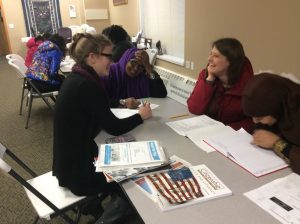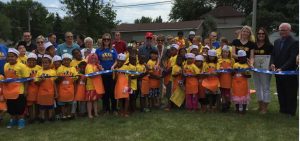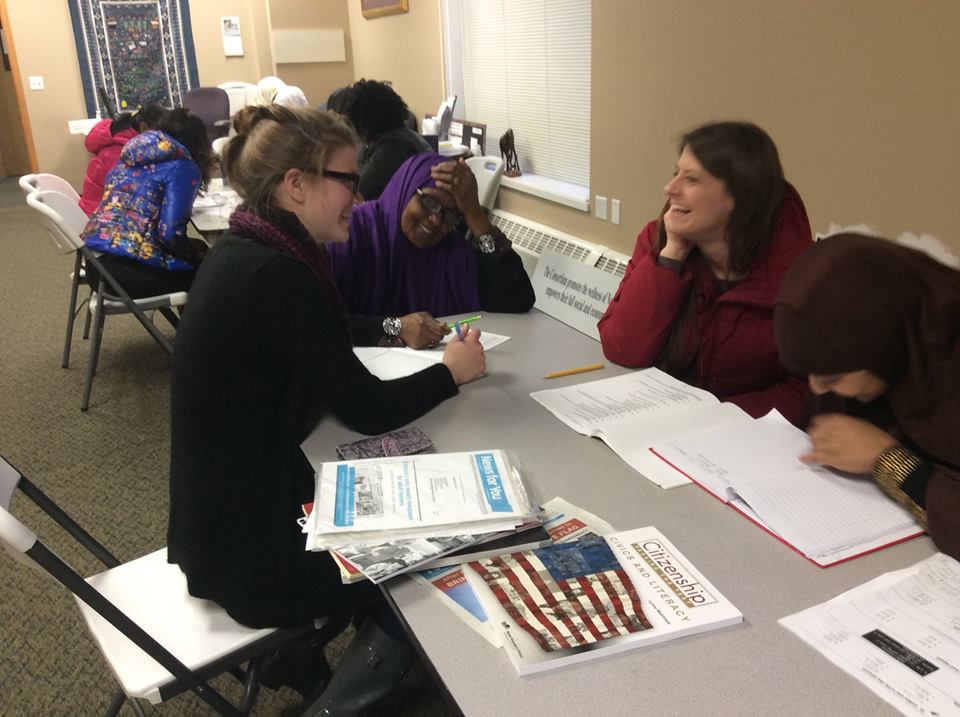Every refugee who resettles in Fargo-Moorhead makes the same first stop on their journey to become a part of the community: Lutheran Social Services. But that’s not where it ends. There are many stops New Americans can make to receive support so that assimilating to life in Fargo-Moorhead is a bit easier.
Lutheran Social Services helps approximately 400 refugees resettle in North Dakota each year. After all the paperwork is signed at LSS, refugees need assistance from the community too, which they receive from numerous community partnerships and nonprofits around Fargo-Moorhead. Several organizations, volunteers, and community members provide those extra steps to New Americans after LSS has done their work. Often times, they even partner together. The LSS website reports that in 2015, 113 volunteers donated over 10,000 hours of service to assist LSS in resettlement work.
“The volunteer agencies who were responsible for the resettlement work discovered early on that in order to be most effective with resettlement there had to be community support for integrating individuals who were resettled into the community,” said Shirley Dykshoorn, vice president for senior and humanitarian services at LSS.
Dykshoorn was also the State Refugee Coordinator in North Dakota in the 1980’s. These volunteer agencies, including LSS, have since been dedicated to finding New Americans support for learning English, gaining employment, and finding housing.
Fargo-Moorhead is home to New Americans from several different countries such as Bhutan, Sudan, The Democratic Republic of the Congo, Liberia, and Iraq. Dykshoorn said that most of the time when a refugee comes to the country the only possessions that they have are the clothes on their backs and a bag of medical records and paperwork for LSS. Everything else has to be provided by LSS or the community so that the New Americans can become self-sufficient individuals.
LSS provides refugees with the basics like housing, coats, groceries, job placement, and education right away, but it takes much more than that. “What refugees need most is to feel welcome and feel a source of support,” Dykshoorn said. “Money is not enough.”
Changes in the process
Darci Asche, Director of Development at the New American Consortium for Wellness and Empowerment Center (WE Center) has assisted refugees for most of her life and noticed how the refugee resettlement processes in the community has changed over the years.
“Back then (1980’s) refugees couldn’t come to the US without a church sponsor,” Asche said.
Asche grew up in small town in North Dakota where the local Catholic Church started assisting refugees after the Vietnam War. Her family hosted one of the New American families and Asche began helping them with English. She then joined the Women of the Evangelical Lutheran Church in America to help refugees. After that, Asche was led to LSS where she began to volunteer. Later she received a full time position and for 20 years was head of refugee resettlement and foster care. She later joined the WE Center to be a part of the resources available to refugees after LSS.
Several nonprofits in town are dedicated to the growth and development of the New American population in a variety of ways, such as the New American Consortium of Wellness and Empowerment, CHARISM (Community of Homes And Resources in Service to Many), and Growing Together Community Gardens. Each one provides New Americans with their secondary steps in being a part of the community.
“LSS helps New Americans with registration and government help and paperwork, (and) we offer resources like life skills and building relationships in the community,” said Andrea Jang, community outreach coordinator for CHARISM.
Even though the agencies have different roles, all have similar elements. They provide New Americans with a chance to have more education, build relationships, and receive necessities to live a full life in the community.
The WE Center: A place for nurturing
The New American Consortium of Wellness and Empowerment, or WE Center, is one of the newest organizations, which started because of “mutual and unique needs of the Bhutanese, Somali, and African populations,” Asche said.
The WE Center is actually a partnership between five refugee community organizations: the African Initiative for Progress, the Somali Community Development Center of North Dakota, the Bhutanese Community in Fargo, the Global Youth United, and the Giving and Learning Foundation.
“We provide a place for them in their own ethnic groups outside their apartments while also giving them a chance to connect with more communities,” Asche said.
The Consortium is built upon two pillars. The first is wellness—physical, spiritual, and emotional. Physical wellness is reached through health education, youth soccer programs, a partnership with Growing Together Gardens, and mental and physical healing through yoga classes. Spiritual wellness at the WE Center means art classes and cultural conversations. Emotional wellness refers refugees to different health services.

The second pillar is all about empowerment through education, socialization, and occupation assistance. Educational and social empowerment opportunities include ELL classes and language exchanges where New Americans can teach other members from different cultures in their native tongue. They also provide afterschool programs, summer mentoring assistance, citizenship classes, and immigration services. Occupational empowerment is provided through job skill development like resume building, mock interviews, and employment referrals.
“We started plugging ideas for what the WE Center would be and what their (refugees) needs were,” Asche said, “Leadership and development was needed to connect with greater community of refugees needs.”
CHARISM: Building community and relationships
CHARISM was created 22 years ago by local churches and the Community Homes subsidized housing complex in South Fargo. Their first goal was to provide programming for low-income families in the neighborhood. Once refugees started moving into the area, the needs of the community shifted. That’s when CHARISM began offering services primarily to New Americans and their families. Today, their overall mission is building connections with the neighborhood.
“We’re really relationship based, like a big family,” Jang said. “I started out volunteering three hours a week with the grocery assistance program, became addicted to helping families, so quit my full time job at NDSU and started working here.”
CHARISM’s programs for New Americans serve people from over 23 countries such as Nepal, Bhutan, and several African countries, Jang said. They have afterschool programs for youth, tutoring and citizenship classes, STEM and English programs, grocery assistance, and a gardening program which Growing Together helped get started.
Each class has around 20 students who learn more than just English. Jang said the classes teach girls and boys about their different strengths.

Partnerships with the other community programs for New Americans are also important to CHARISM. Carl Ben Eielson and Discovery Middle Schools, the YWCA, Fargo Park District, Fargo Police Department, Community Homes, and Great Plains Food Bank are all connected with CHARISM’s work with refugees.
“We wouldn’t be able to function without them,” Jang said.
Great Plains Food Bank delivers all of the nonperishable items to CHARISM to assist with their grocery program. According to their website, each Tuesday and Friday residents in need from the neighborhood can go to CHARISM and receive the donated food.
CHARISM offers several volunteer opportunities. Paid positions are available for mentors and tutors, and they always need people to help out with the grocery program Jang said.
Giving goes both ways
More assistance for New Americans include the people and places such as the Fargo Rotarians, Agassiz Adult Learning Center and Carl Ben Eielson schools, Olivet Lutheran and Bethel Evangelical Free churches.
Asche identified the two major challenges for New Americans to be learning English and transportation. That’s why so much of the help from the community includes opportunities to gain better speaking, reading, and writing skills as well as transportation services.
According to the LSS website, The Rotarians donate computers, language software, and time to teach English to New Americans. Carl Ben, Discovery, and Agassiz are a few of many schools that have ELL classes for New American students.
Programs like Project Boaz assist in the transportation need. Olivet Lutheran Church and Bethel Evangelical Free Church team up every summer with their community and congregations to work together by collecting and restoring bicycles for New Americans.
“This is such a wonderful and tangible way that the community gives back,” Dykshoorn said.
Olivet Lutheran is also part of creating the Growing Together Community Gardens. The gardens offer New Americans a chance to work on one six community gardens where they get a chance to meet other refugees and native Fargo-Moorhead people and gain fresh veggies that they helped plant.
There are endless stops New Americans can make in this community to receive the skills and necessities to succeed, but there is just one other thing they need to become successful.
“We need everyone to have an open mind and treat them just as we would any other neighbor,” Jang said “People need to realize that they are so hardworking and really want to succeed here.”
This piece was completed for the Investigating and Narrating the News course where all students reported on refugee issues and stories in Fargo-Moorhead.


An excellent overview. With all the needs it appears we should get the individual churches again. Not only would there be more services for New Americans but we would also be building more community awareness and occasionally find new “Darci Asche” persons for the future!